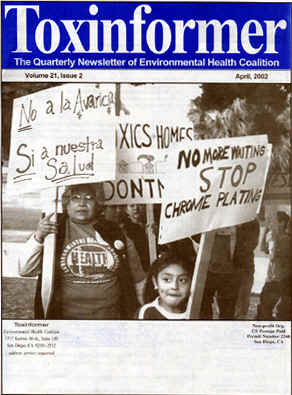
If you stand at the corner of Cesar E. Chavez Parkway and Newton Avenue in Barrio Logan on a typical weekday morning, you might not be able to see to the other side, much less find a safe way to cross the Parkway. Tractor-trailer trucks, dozens of them, line the street as they make their way to and from the industrial waterfront and Interstate-5.
Children are forced to dodge these trucks every morning on their way to school. In addition to the obvious safety issues, there are the toxic fumes to contend with. Think of how much you hate to be stuck in traffic behind a diesel truck or bus belching black smoke. Now think about breathing the fumes created by more than 20 diesel vehicles in a row, and remember that diesel exhaust has been blamed by the state for more than two-thirds of the cancer risk in urban air.
So who should have the authority to decide whether those trucks should be allowed to use the Parkway or any residential or commercial street? Who should have the authority to restrict traffic, especially large truck traffic, for reasons of safety in residential neighborhoods? For more than a year, Environmental Health Coalition has been working with local residents to re-route trucks from the Parkway. Most of the trucks are coming from the Port District’s Tenth Avenue Terminal and using the Parkway, formerly Crosby Street, to enter and exit I-5. The Port District has talked with EHC, community residents, and the City of San Diego about re-routing options.
However, if a recent court case is not overturned on appeal, none of these efforts will bear fruit because no local agency will have the authority to prohibit trucks from using any highway or local road, including those streets that exclusively serve residential neighborhoods.
You might be surprised to learn that you would need to pass a State law to restrict truck traffic on local streets. This is the result of a recent court decision, California Dump Truck Owners Association v. Gray Davis, in which dump truck owners claimed that provisions of California law that allow local governments to regulate trucks conflict with the Federal Aviation Administration Authorization Act. The FAAA Act, which purportedly deregulated the airline industry, also prohibits any regulation of the price or route of the transportation of goods, except safety regulations adopted by a State. Thus, according to this interpretation of the FAAA Act, it will take an act of the California Legislature to get the trucks off Cesar Chavez Parkway or any other street, including those that are adjacent to schools.
An example is Beardsley Street, which runs along one edge of Perkins Elementary School in Barrio Logan and is currently closed to truck traffic. Because of this ruling, it could be re-opened as another route to the terminal.
The decision of the court in the Dump Truck case represents the latest distortion of the concept of deregulation. This severe restriction on the power of local authorities to promote safe streets and neighborhoods must not be allowed to stand.
EHC joins with the California League of Cities in urging local municipalities to challenge this decision before the Ninth Circuit Court of Appeals. We urge the City of San Diego and the Port District to join this challenge in order to preserve their ability to provide safe streets for San Diego residents.
Common sense tells us that local communities should have control over planning issues that affect their health and safety. To restrict community members’ rights to protect themselves is unjust, unfair, and counterproductive to the progress made toward allowing residents to create the kind of neighborhoods in which they want to live and raise their children.
